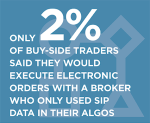Transaction Fees, Market Data and Questions About the CAT Top List of Market Structure Issues for 2019
February 7, 2019
Only 2% of traders said they definitely would execute electronic orders with a broker who only used SIP data in their algos, and nearly 1 in 3 want the SEC to pull the plug on the Consolidated Audit Trail (CAT).







